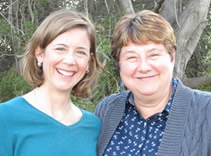Skidmore helps F.I.T. Club bring food, fitness, and farming into the classroom
As a physician working in underserved urban areas in Rhode Island for over a decade, Kristin Lehr Anderson ’95 became concerned by the unprecedented number of children and adults she was treating for obesity, diabetes, and associated chronic diseases. Her personal experience confirmed what she knew to be a nationwide epidemic. At its root, she discovered, is a lack of basic knowledge about food production, cooking, and nutrition. She observed that cultural shifts have been causing a generation of children to lose out on learning about food preparation at home. To compound matters, budget constraints have chiseled down school curricula to basic academic subjects, so that courses like home economics are no longer available in many schools to teach children life skills related to food or about the link between nutrition and disease.
 Anderson knew that education is the key to reversing this trend but also that most
teachers are already overloaded with curricular demands. Fortunately, she had a ready
resource in that field who was happy to help—her mother, Skidmore Education Department
chair Susan Lehr. Together, they have launched the Framework for Integrated Teaching
or F.I.T. Club, a nonprofit that provides an integrated Web-based health curriculum to help teachers
bring the concepts of food, fitness, and farming into classroom instruction. The F.I.T.
Club curriculum integrates Common Core Standards, a national benchmark for competency
in mathematics, English language arts, science, and social studies, into lesson plans
targeting urban school students in the second, fifth, eight, and eleventh grades.
Organized around three themes, Young Farmers Club, Young Chefs Club, and Young Doctors
Club, curricular webs explore food sourcing and production, cooking, sustainability,
nutrition, and disease using children’s fiction, nonfiction literature, and hands-on
activities. Lessons for a Young Farmers Club second grade class might focus on where
the ingredients that make up one of their favorite foods, the cookie, comes from;
students would explore how flour is made from wheat and how grapes turn into raisins.
Older students might study such elements of farm ecology as pollination of crops by
bees and composting of waste by earthworms.
Anderson knew that education is the key to reversing this trend but also that most
teachers are already overloaded with curricular demands. Fortunately, she had a ready
resource in that field who was happy to help—her mother, Skidmore Education Department
chair Susan Lehr. Together, they have launched the Framework for Integrated Teaching
or F.I.T. Club, a nonprofit that provides an integrated Web-based health curriculum to help teachers
bring the concepts of food, fitness, and farming into classroom instruction. The F.I.T.
Club curriculum integrates Common Core Standards, a national benchmark for competency
in mathematics, English language arts, science, and social studies, into lesson plans
targeting urban school students in the second, fifth, eight, and eleventh grades.
Organized around three themes, Young Farmers Club, Young Chefs Club, and Young Doctors
Club, curricular webs explore food sourcing and production, cooking, sustainability,
nutrition, and disease using children’s fiction, nonfiction literature, and hands-on
activities. Lessons for a Young Farmers Club second grade class might focus on where
the ingredients that make up one of their favorite foods, the cookie, comes from;
students would explore how flour is made from wheat and how grapes turn into raisins.
Older students might study such elements of farm ecology as pollination of crops by
bees and composting of waste by earthworms.
Young Chefs Club lessons use math to teach grocery shopping, measuring, and budgeting and social studies to explore food traditions in various cultures.
The Young Doctors Club component is modeled on an afterschool program Anderson developed as an intern at the Rhode Island Hospital as a partnership between the Medicine-Pediatrics Residency Program of Warren Alpert Medical School at Brown University and Roger Williams Middle School on the Southside of Providence, RI. Now in its eleventh year, the program brings eighth-graders to Rhode Island Hospital biweekly to learn about medical careers and disorders such as diabetes and heart disease. In the Young Doctors Club curricular web, students will meet hypothetical patients such as E.J. Fiber and Betty Sweet, who present in the emergency room with complaints ranging from colon cancer to high blood sugar. Using these cases, students will learn about healthy human body systems and how poor nutrition can impact them, resulting in disease. Brown’s Medicine-Pediatrics Residency Program is a F.I.T Club partner.
Anderson and Lehr, who serve as the organization’s executive co-directors, are also collaborating with Skidmore’s Education Studies Department to bring current education majors and alumni master teachers into F.I.T. Club’s implementation process. Education majors in their junior year have written curricular webs and compiled book lists for F.I.T Club. Outstanding seniors who have completed their field placements are awarded a stipend of $250 to develop 15 lesson plans based on the F.I.T. club curriculum. The partnership was launched last year, when a single awardee, Allison Putnam ’13 was tasked with creating 15 lesson plans about pizza. Using high quality children’s books, her creativity, and a strong foundation in coursework and field placements, Putnam created a series of compelling experiences for second and fifth graders that included exploration of the food pyramid, planting tomatoes, steps in making a pizza, and a poetic ode to pizza dough. This year, F.I.T. Club awards were given to four seniors, Martha Prince ’14, Jessica Langsam ’14, Melissa Davis ’14, and Jessica DeTorres ’14, who are following up on the food theme. Skidmore alumni working in urban schools who have been identified as “master teachers” have been “test-driving” the lesson plans over the course of the school year, expanding, critiquing, or enhancing them as needed. The revised plans will be returned to the student authors to help improve their skills. Anderson says she and Lehr “are anxiously awaiting” the teachers’ feedback. She aims to have the revised plans uploaded to F.I.T. Club’s Web site this summer.
For more information about F.I.T. Club, visit www.teachfitclub.org.

